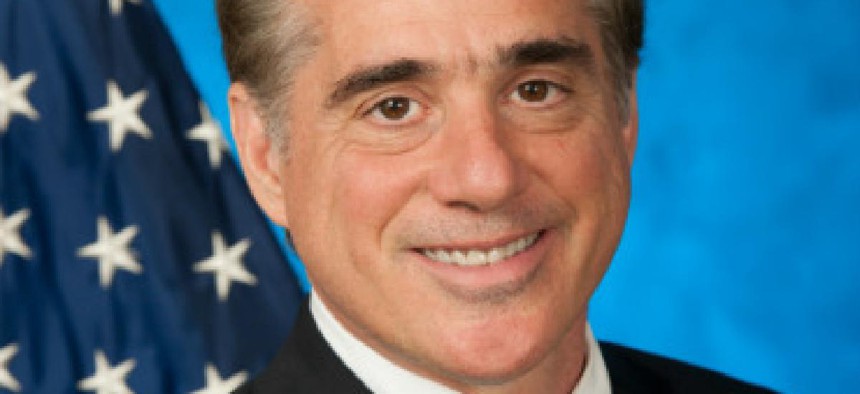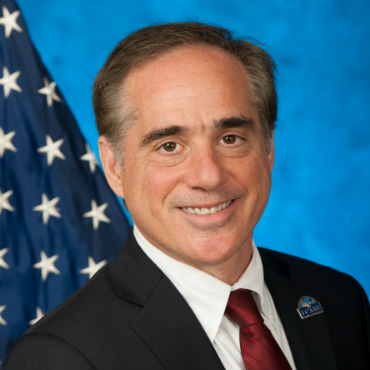Shulkin pledges no 'learning curve' as VA secretary

The Senate Veterans Affairs Committee conducted a bipartisan hearing to elevate current VA Undersecretary for Health to lead the agency, while elsewhere in the legislative chamber, panels were at odds over other Trump cabinet picks.

Dr. David Shulkin, a holdover from the Obama administration, appears headed to easy confirmation to lead the Department of Veterans Affairs.
As turmoil over President Donald Trump's cabinet nominees roiled the Senate, one prospective agency head seemed to sail through his hearing, earning plaudits from both sides of the aisle.
Dr. David Shulkin, an Obama administration holdover, was tapped by Trump to lead the Department of Veterans Affairs. Shulkin is currently that department's undersecretary for health, and in charge of leading VA's massive system of hospitals and medical centers.
Shulkin's nomination was announced, almost as an aside, at a January press conference in which the then-president-elect outlined plans for management of his many businesses during his presidency.
Trump had floated many other names, including Cleveland Clinic CEO Toby Cosgrove, a onetime candidate for the post under Obama. Other candidates included former Sen. Scott Brown, Lockheed Martin Senior Vice President Leo Mackay and Pete Hegseth, a Fox News commentator and leader of a group in favor of privatizing the VA.
"I want you to succeed, I really do," said Sen. Jon Tester (D-Mont.), the new ranking member of the Senate Veterans' Affairs Committee. "But there was a reason it took so long to find someone to sit in that chair today."
While Trump frequently spoke on the campaign trail about privatizing the VA, there appears to be little appetite for the move in the Senate, or among mainstream veterans' service organizations, where there is broad support for the reforms underway to allow some access to private sector care via the Veterans Access, Choice and Accountability Act of 2014.
Committee Democrats warned of backroom plans to take the VA private, while Republicans dismissed such fears as overblown. In any case, Shulkin said he was not there to execute that policy.
"The Department of Veterans Affairs will not be privatized on my watch," Shulkin said.
Shulkin sought to reassure members on hiring as well, saying he'd secured a commitment from the White House to exempt 37,000 of 45,000 current agency job openings, on the grounds that they are critical and related to health and safety.
He also updated the committee on plans to fix the VA's notoriously problematic scheduling system.
The VA is testing an internally developed scheduling system called the Vista Scheduling Enhancement, which interfaces with the VA's homegrown health record system. Shulkin said that VSE "will be ready for a decision on Feb. 10, whether it's a go or no-go."
A VA spokesperson subsequently told FCW that if approved for national implementation, VSE would be deployed beginning in March through May of this year, starting in Primary Care.
VSE was developed as a low-cost alternative to a commercial scheduling system – which was the original plan to address VA's scheduling woes.
At an April 2014 House hearing, Shulkin explained that the adoption of the commercial Medical Appointment Scheduling System was being put on "strategic hold" during the VSE development and testing.
In the Feb. 1 confirmation hearing, Shulkin was firm on the need for a change.
"They're using what I would call old blue DOS screens to schedule," he said. "I don't even know how they do their jobs."
Members of both parties said they were looking for a swift confirmation, but cautioned that Shulkin won't have much runway to prove he can do the job.
"You're not hearing me asking for a learning curve," Shulkin said. "I'm eager not to waste another day."
Delays and rule changes
At the VA hearing, committee chairman Sen. Johnny Isakson (R-Ga.) praised the panel for avoiding the "monkey business" that was going on in other committees.
Fierce Democratic opposition to some of Trump's nominees led to a breakdown of normal businesses across the Senate.
The Health, Education, Labor and Pensions committee suspended its quorum rules and favorably reported the nominations of banker Steven Mnuchin to lead the Treasury Department and Rep. Tom Price (R-Ga.) to lead the Department of Health and Human Services on party line votes with no Democrats present.
At the Senate Oversight and Government Affairs Committee, Democrats blocked a vote on the nomination of Rep. Mick Mulvaney (R-S.C.) to lead the Office of Management and Budget. That meeting and vote was rescheduled for Feb. 2.
NEXT STORY: OPM explains the hiring freeze



